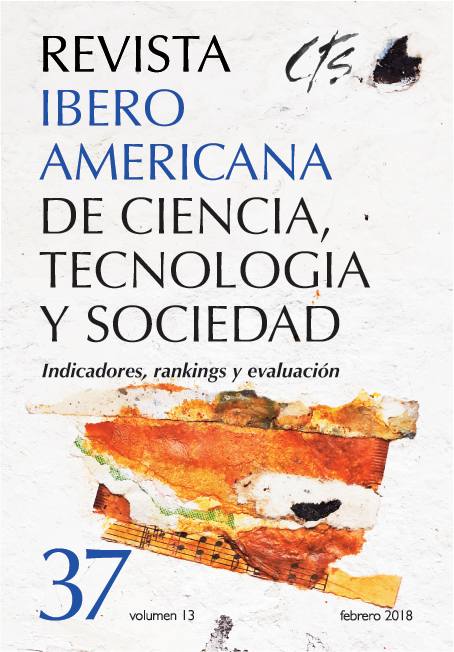International Rankings and the Positioning of Latin America. A Reflective Look
Keywords:
international rankings, higher education institutions, world class universities, quality assurance, evaluationAbstract
This article briefly revises the international rankings and identifies the three with the greatest relevance and influence on higher education institutions. It analyzes their distinctive characteristics and how the results impose a university model: the elitist research university. The “world class” university represents the most desirable model and places Latin American universities in a situation of marginalization.Downloads
References
ALBORNOZ, M. y OSORIO, L. (2017): “Uso público de la información: el caso de los rankings de universidades”, Revista Iberoamericana de Ciencia, Tecnología y Sociedad -CTS, vol. 12, n° 34, pp. 11-49.
BARSKY, O. (2014): La evaluación de la calidad académica en debate: los rankings internacionales de las universidades y el rol de las revistas científicas, Buenos Aires, Teseo - UAI.
BOURDIEU, P, (1984): Homo academicus, París, Les Éditions de Minuit.
BRUNNER, J. J. (2007): Universidad y sociedad en América Latina, Veracruz, Biblioteca digital de Investigación Educativa Universidad Veracruzana.
BRUNNER, J. J. (2012): “La idea de universidad en tiempos de masificación”, Revista Iberoamericana de Educación Superior (RIES), vol. 3, n° 7, pp. 130-143.
BRUNNER, J.J. y FERRADA HURTADO, R. (2011): Educación Superior en
Iberoamérica, Santiago de Chile, CINDA.
BURTON, C. (1992): El sistema de educación superior, Ciudad de México, Nueva Imagen.
COX C. y COURAD, H. (1990): “Autoridades y Gobierno en la Universidad Chilena 1950 – 1989. Categorías y Desarrollo Histórico”, en C. Cox (ed.): Formas de Gobierno en la Educación Superior: Nuevas perspectivas, Santiago de Chile, FLACSO, pp. 51-109.
ENDERS, J. (2015): “Una ‘carrera armamentista’ en la academia: los rankings internacionales y la competencia global para crear universidades de clase mundial”, Revista de la Educación Superior, vol. 44, n° 176, pp. 83-109.
FERREYRA, M. M., AVITABILE, C., BOTERO ÁLVAREZ, J., HAIMOVICH PAZ, F. y URZÚA, S. (2017): Momento decisivo: la educación superior en América Latina y el Caribe, Washington DC, Banco Mundial.
GACEL–ÁVILA, J. (2017): “La postura de América Latina y el Caribe frente a los rankings globales”, Revista de la Educación Superior en América Latina, n° 1, pp. 6-8.
GUAGLIANONE, A. (2013): Políticas de evaluación y acreditación en las
universidades argentinas, Buenos Aires, Teseo-UAI.
IESALC-UNESCO (2012): Las Universidades Latinoamericanas ante los Rankings Internacionales: Impactos, Alcances y Límites. Disponible en: http://www.encuentrorankings.unam.mx/.
LOPEZ-COZAR DELGADO, E. (2012): “Cómo se cocinan los rankings universitarios”, Dendra Médica. Revista de Humanidades, vol. 11, n° 1, pp. 43-58.
ORDORIKA, I. (2015): “Rankings universitarios”, Revista de la Educación Superior, vol. 44, n° 173, pp. 7-9.
RIZO MARTÍNEZ, F. (2011): “Los rankings de universidades: una visión crítica”, Revista de la Educación Superior, vol. 40, n° 157, pp. 77-97.
RODRÍGUEZ, M. (2011): ¿Calidad o excelencia universitaria? Paradigmas en el Siglo XXI, crítica, razón y ciencia. Disponible en: https://paradigmasenelsigloxxi.wordpress.com/2011/11/03/calidad-o-excelencia-universitaria/.
SALAMI, J. (2009): El desafío de crear universidades de rango mundial, Banco Mundial.
SCHWARTZMAN, S. (1996): “Las universidades latinoamericanas en contexto”, en S. Malo y S. Morley: La Educación Superior en América Latina - Testimonios de un Seminario de Rectores, Banco Interamericano de Desarrollo y Unión de las Universidades de América Latina, pp. 7-28.
THE NATIONAL COMISSION ON EXCELLENCE IN EDUCATION (1983): A Nation at Risk: The imperative for Education Reform, Washington DC.
VILLASEÑOR BECERRA, J., MORENO ORELLANO, C. y FLORES OROZCO, J.
(2015): “Perspectivas actuales sobre los rankings mundiales de universidades”, Revista de la Educación Superior, vol. 44, n° 175, pp. 41-67.
WEICK, K. (1976): “Educational organizations as loosely coupled systems”, Administrative Science Quarterly, vol. 21, n° 1, pp. 1-19.
Downloads
Published
How to Cite
Issue
Section
License
All CTS's issues and academic articles are under a CC-BY license.
Since 2007, CTS has provided open and free access to all its contents, including the complete archive of its quarterly edition and the different products presented in its electronic platform. This decision is based on the belief that offering free access to published materials helps to build a greater and better exchange of knowledge.
In turn, for the quarterly edition, CTS allows institutional and thematic repositories, as well as personal web pages, to self-archive articles in their post-print or editorial version, immediately after the publication of the final version of each issue and under the condition that a link to the original source will be incorporated into the self-archive.











